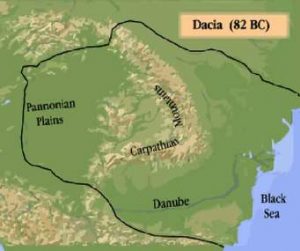Romania
Romania does not automatically leap to mind as a possible location for Atlantis, nevertheless, in 1913 a massive book by Nicolae Densusianu was published in which such a claim was made. The suggestion was made en passant in this large work, which is mainly concerned with the prehistoric evolution of civilisation in the Dacia region of Romania. The 1000-page+ book in English is available in its entirety on the Internet[1597].
The Pannonian Plain, now part of Hungary was formerly part of ancient Dacia. A paper was submitted to  the 2008 Atlantis Conference in Athens by three Romanian researchers, M. Ticleanu, P. Constanin and R. Nicolescu proposing that this region had been the original location of Atlantis. This paper, together with a large number of maps, is now available on the internet(a).
the 2008 Atlantis Conference in Athens by three Romanian researchers, M. Ticleanu, P. Constanin and R. Nicolescu proposing that this region had been the original location of Atlantis. This paper, together with a large number of maps, is now available on the internet(a).
The location of the Pillars of Heracles is also discussed in depth and the author not unexpectedly also locates them along the Danube (Pt3 – Ch.XVI). It is noteworthy that in ancient times the Danube was called Okeanos Potamos.
To what extent nationalistic motives were the moving force behind this noteworthy tome is difficult to ascertain, but the possibility should be borne in mind. However, his excessive nationalism, was popular during the communist regime, but is now deemed unacceptable and his work discredited.
Nevertheless, interest in Densusianu and aspects of his theories have seen a resurgence in books from researchers such as Adrian Bucurescu and Alexandra Furdui.
>A cache of Roman coins was discovered in Transylvania in 1713. Originally accepted as genuine they were later, in 1868, denounced as forgeries. Now they are again being considered genuine. The debate centres on the image on the coins of Emperor Sponsian of whom no other record is known. It has been remarked that “at that time the bar for being an emperor was very old(b).<
In the meantime, neighbouring Bulgaria had seen the unearthing of remarkable artefacts, including gold jewellery, dating to 3000 BC and is now claiming the discovery of rock temples in the Rhodope Mountains that are a thousand years older than the Mesopotamian and Egyptian civilisations. Watch this space.
